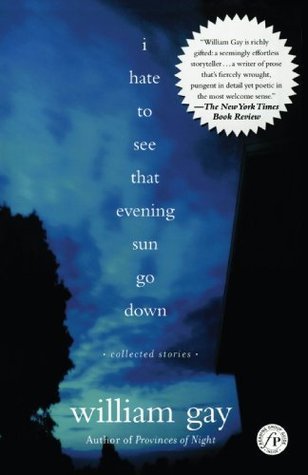What do you think?
Rate this book


320 pages, Paperback
First published September 24, 2002
She’d asked him about drugs once and never forgotten what he’d said. Everybody’s on drugs, he said. The world’s on drugs. Heroin, sex, booze, money. Television. Comfort. What I get from you, that’s a drug. Calmness. Any kind of crutch you can hobble through the goddamned day on is a drug. Darkness.
The Grim Reaper had leaned to him face to face and laid a hand to each of his shoulders and kissed him hard on the mouth, he could smell the carrion breath and taste graveyard dirt on his tongue. He suddenly saw that all his youthful optimism was long gone, that his time had come and gone to waste. That things were not all right and would probably not be all right again.

This is a collection of thirteen short stories by William Gay. I loved Gay’s first two novels, and I REALLY love short stories. Thus I looked forward to cracking open I Hate to See That Evening Sun Go Down.
There are several fine stories here. There are quite a few that I expect I will remember for a long while. I will briefly highlight the most affecting tales in this grouping.
‚ÄúBonedaddy, Quincy Nell, and the Fifteen Thousand BTU Electric Chair‚Ä� features a nasty backwoods lothario who scorns a young mother-to-be. The wrong mother-to-be, according to author William Gay.
The collection includes a story called ‚ÄúThe Paperhanger‚Ä� which can only be characterized as pure horror of the most nightmarish sort. When a little girl goes missing, ‚ÄúThe Paperhanger‚Ä� explores the psychotic mind more deeply than I care to go.
‚ÄúSugarbabe‚Ä� is otherworldly. A dispute arises between a wife and husband over a pet. As Gay spins this weird yarn, the author demonstrates his uncanny mastery of the unexpected twist.
Three of these stories feature bodies which had been frozen, none voluntarily.
Extra credit to William Gay for name-dropping the ‚Äúsnail darter‚Ä� in ‚ÄúStanding By Peaceful Waters‚Ä�; the snail darter was a tiny endangered species of fish which, for a period in the 1970‚Äôs, completely halted the damming of the wild Tellico River in eastern Tennessee by the federal government.
Gay also deserves extra extra credit for mentioning three of my favorite musicians in ‚ÄúGood ‚ÄòTil Now‚Ä�: Emmylou Harris, John Prine, and Townes Van Zandt.
This is another winner from the strange imagination of William Gay.
My rating: 7/10, finished 1/13/22 (3606).